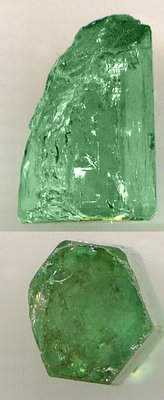The third stone on the second row of the
choshen is יָהֲלֹם - yāhalom. JPS translates this as "emerald."
In
Shemot 28:17-21:
| יז וּמִלֵּאתָ בוֹ מִלֻּאַת אֶבֶן, אַרְבָּעָה טוּרִים אָבֶן: טוּר, אֹדֶם פִּטְדָה וּבָרֶקֶת--הַטּוּר, הָאֶחָד. | 17 And thou shalt set in it settings of stones, four rows of stones: a row of carnelian, topaz, and smaragd shall be the first row; |
| יח וְהַטּוּר, הַשֵּׁנִי--נֹפֶךְ סַפִּיר, וְיָהֲלֹם. | 18 and the second row a carbuncle, a sapphire, and an emerald; |
| יט וְהַטּוּר, הַשְּׁלִישִׁי--לֶשֶׁם שְׁבוֹ, וְאַחְלָמָה. | 19 and the third row a jacinth, an agate, and an amethyst; |
| כ וְהַטּוּר, הָרְבִיעִי--תַּרְשִׁישׁ וְשֹׁהַם, וְיָשְׁפֵה; מְשֻׁבָּצִים זָהָב יִהְיוּ, בְּמִלּוּאֹתָם. | 20 and the fourth row a beryl, and an onyx, and a jasper; they shall be inclosed in gold in their settings. |
| כא וְהָאֲבָנִים תִּהְיֶיןָ עַל-שְׁמֹת בְּנֵי-יִשְׂרָאֵל, שְׁתֵּים עֶשְׂרֵה--עַל-שְׁמֹתָם; פִּתּוּחֵי חוֹתָם, אִישׁ עַל-שְׁמוֹ, תִּהְיֶיןָ, לִשְׁנֵי עָשָׂר שָׁבֶט. | 21 And the stones shall be according to the names of the children of Israel, twelve, according to their names; like the engravings of a signet, every one according to his name, they shall be for the twelve tribes. |
And Midrash Rabba agrees that it is emerald. It states: זבולון אזמרגדין. Jastrow (pg 38) states it is equal to Greek
smaragdos, which is emerald, though it can also mean a "colored crystal."
This is confusing to me, because JPS already used "smaragd" to translate
bareqet, so if smaragd = emerald, how can they use "emerald" here.
On
bareqet, this is what I wrote about emeralds:
Now, smaragd is just another name for emerald. According to Wiktionary, emerald comes from:
Middle English emeraude, from Old French esmeraude, from Vulgar Latin *esmaralda, *esmaraldus, variant of Latin smaragdus, from Greek σμάραγδος, μάραγδος (smaragdos, maragdos), from Sanskrit मरकत (marakata).
It is a green transparent form of beryl.

And here is a picture of emeralds.


No comments:
Post a Comment